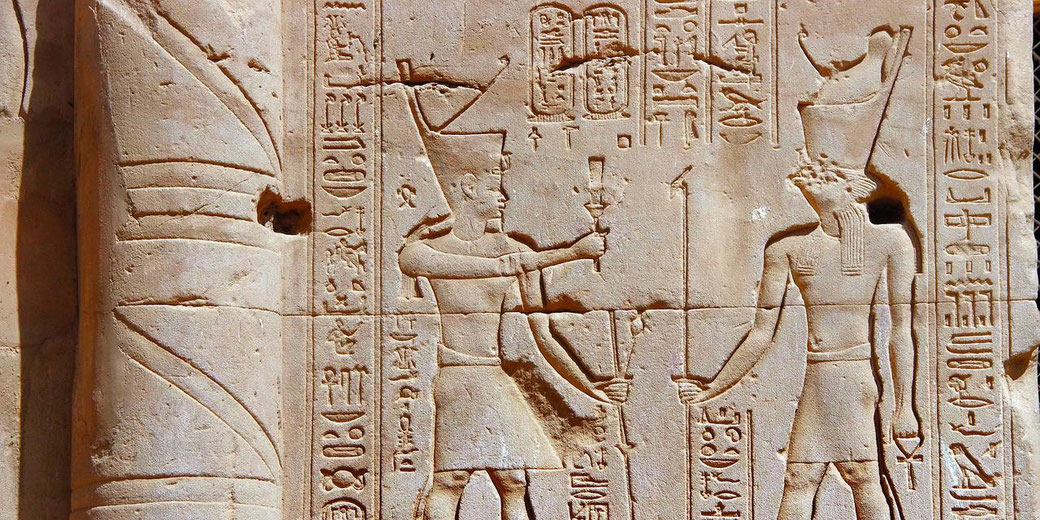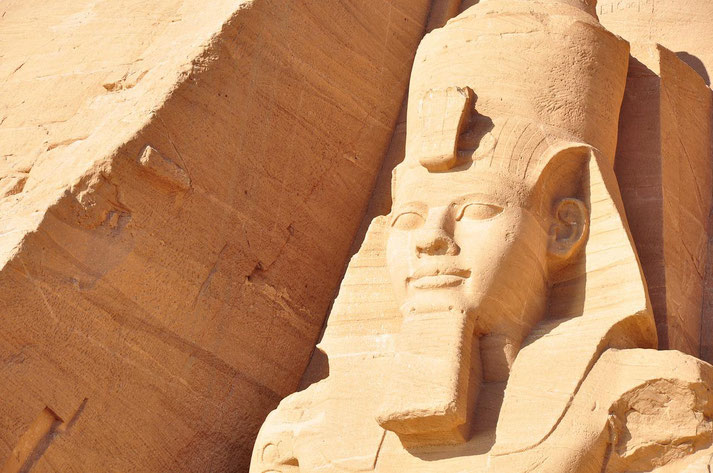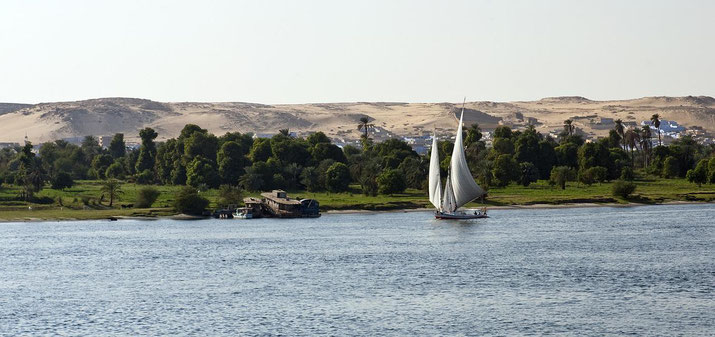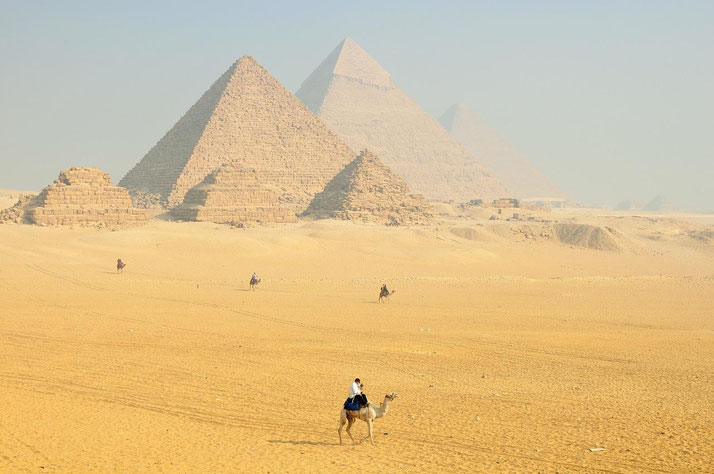What were an Egyptian pharaoh's roles and responsibilities?

The king of ancient Egypt was known as the 'pharaoh' and whoever held this position had absolute authority in the kingdom.
Not only was a pharaoh a political position, the ancient Egyptians believed that the pharaoh was also a living god on Earth.
This combination of political and religious elements in the pharaonic role meant that anyone who was pharaoh had many responsibilities to fulfil.
Ultimately, he was responsible for the well-being of his people and had to maintain a balance between the environment and the economy.
If they failed in these duties, a great disaster could fall upon Egypt.
The origins of the pharaoh
The origin of the word 'pharaoh' is not known for sure, but it is thought to have originated during the Old Kingdom period.
The title originally meant 'great house', which referred to the royal palace. It later came to mean 'king of Egypt'.
However, the first known use of the title 'pharaoh' was in the 18th Dynasty, during the reign of Amenhotep III, and was commonly used to refer directly to the king of Egypt in the New Kingdom period, starting around 1550 BC.
However, from the very first pharaoh in the Old Kingdom, the role quickly became of central importance in ancient Egyptian society.
He was the head of state, the military leader, the high priest of every temple, and the supreme judge.
At its core, the position pharaoh was also responsible for ensuring that the gods were happy.
However, it must be mentioned that while most pharaohs were men, there were a number of famous female pharaohs who held this position as well.

The pharaoh's role in Egypt's religion
The pharaoh was considered to be a living god on Earth, and as such, he had many responsibilities to both gods and humans.
He was responsible for maintaining balance in the universe and ensuring that Ma'at (a concept that meant something like "order", "truth", or "justice") prevailed.
As the high priest of every temple in Egypt, the pharaoh was responsible for performing rituals and offering sacrifices to the gods.
In doing so, he ensured that the gods were happy and that they would continue to provide for the people of Egypt.
However, the pharaoh could not be personally present at every temple for every ceremony, so he appointed high priests to oversee the temples in his place.
In the temples across Egypt, there was a complex religious hierarchy with various ranks of priests and priestesses who performed daily rituals and tasks.
Most of the time, the high priests, which were appointed by the pharaoh, were given significant freedom and power to carry out their religious duties.
However, the pharaoh still had final say over all religious matters.
An example of this is the pharaoh Akhenaten, who controversially changed the religion of Egypt from polytheism to monotheism.
This dramatic change was not universally accepted, and this upset the priests of the other gods, as it meant that they would no longer have a job.
Akhenaten was within his rights as pharaoh to make this change, however the old religious practices were restored after his death.

The pharaoh as a military conqueror
As the head of state, the pharaoh was responsible for leading Egypt in times of war.
He was expected to personally command the Egyptian army and lead them into battle.
If the pharaoh was victorious, he would return home as a hero, and his people would celebrate his achievements.
The pharaoh was also responsible for maintaining Egypt's borders. He did this by building fortifications along the Nile River, and by stationing troops at strategic points along the border.
This ensured that Egypt was safe from invaders.
The pharaoh also had to deal with problems at home, such as rebellions and civil unrest.
He was expected to do this by crushing any uprising quickly and harshly punishing its leaders.
Thutmose III exemplified this role of the pharaoh when he put down a rebellion in Syria.
He did this by leading his army into battle and defeating the rebels. This victory cemented his position as a strong and powerful ruler.
Economy
In addition, the pharaoh was responsible for ensuring that the economy of ancient Egypt flourished.
One of the most important jobs was the maintenance of irrigation systems along the Nile.
These systems were crucial in successful agriculture, which was at the heart of the Egyptian economy.
Unlike today, the Egyptians did not have a standard form of currency like coins.
Instead, their economy was based upon the agricultural goods that farmers produced, whether it be grain, animals, or food products.
From these products of his kingdom, the pharaoh was responsible for ensuring that taxes were collected.
Each farmer was required to give up around 20% of all of their products to the pharaoh himself in taxes.
This was then used by the pharaoh to fund his own building projects and military campaigns.
Such projects provided employment for Egyptians and helped to boost the economy.
The king also controlled trade with other countries. The land of Egypt had few natural resources and, as a result, it relied heavily on imported goods for many valuable commodities.
For example, gold had to come from Nubia to the south, and wood had to be brought in from Syria to the north.
Even rarer products like lapis lazuli came from afar away as modern Afghanistan.
So, the pharaoh was responsible for the safety of these important trade networks to meet the needs of his people.
The pharaoh as judge and enforcer of justice
The pharaoh was expected to be a fair and just ruler, who would listen to the concerns of his people and address them accordingly.
At a basic level, he was responsible for maintaining law and order within Egypt.
Theoretically, legal disagreements could be sent to the pharaoh for resolution.
However, in practice, only the wealthy elite were close enough to the king to take advantage of this.
Instead, the pharaoh appointed judges and courts throughout the land so that the common people had an opportunity to have their concerns dealt with.
An orderly justice system reflected well on the pharaoh and was an important way of keeping the common people happy.
The pharaoh's power of nature and the environment
The king of Egypt was also meant to ensured that the Nile River was not polluted, and that the lands around it were fertile.
He also had to protect Egypt from floods and droughts. The pharaoh's irrigation systems helped to prove the necessary water to the land, and his canals allowed for trade between different parts of Egypt.
As a god, it was believed that the pharaoh had control over the annual Nile floods.
He was responsible for making sure that the floods occurred on time, and that they were not too destructive.
The Egyptians believed the pharaoh could influence these events through rituals and offerings to the gods.

The pharaoh's role in foreign diplomacy
The pharaoh was responsible for maintaining diplomatic relations with other countries.
He did this by sending ambassadors to foreign lands, and by hosting dignitaries in Egypt.
He also made treaties with other rulers and negotiated trade agreements. The pharaoh was a powerful ruler, and his word was law.
In a practice that had developed over several centuries, the also pharaoh used marriage to members of his family to solidify alliances with other countries.
It is important to understand the Egyptian pharaohs generally did not marry foreign princesses because it was believed that doing so would elevate foreign royalty to their level.
Rather, they sent their own daughters to foreign courts or gave lesser wives to foreign princes and kings.
However, on some rare occasions in Egyptian history, pharaohs did break this rule.
For example, Ramses II married a Hittite princess in around 1245 BC to secure a peace treaty.
What would happen if a pharaoh failed in his role?
The ancient Egyptians believed that the pharaoh was the ultimate authority and the embodiment of Ma’at, the balance and order of the universe.
If the pharaoh failed in his roles and expectations, it was believed that this would upset the balance and harmony of the universe, which would lead to chaos and disaster.
The consequences of such a failure could be severe. It was believed that the gods would become angry and punish the pharaoh and his people.
This would bring about famine, disease, and other forms of suffering. In periods of Egyptian history where these natural disasters occurred, the pharaoh was blamed for causing it.
In extreme cases, it was believed that the pharaoh’s failure could lead to the end of the world itself.
Moreover, if the pharaoh was seen as weak or ineffective, this could lead to challenges to his authority from within the kingdom or from foreign invaders.
This could result in civil unrest, rebellions, and wars, which could further disrupt the balance and harmony of the universe.
Therefore, the ancient Egyptians placed a great deal of importance on the role of the pharaoh.
They believed that his success or failure had profound consequences for the entire kingdom and the world at large.

Further reading
What do you need help with?
Download ready-to-use digital learning resources
Copyright © History Skills 2014-2025.
Contact via email
With the exception of links to external sites, some historical sources and extracts from specific publications, all content on this website is copyrighted by History Skills. This content may not be copied, republished or redistributed without written permission from the website creator. Please use the Contact page to obtain relevant permission.





